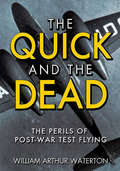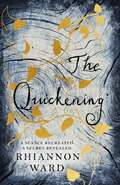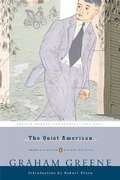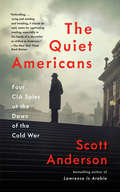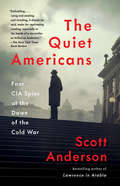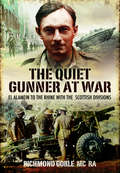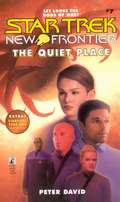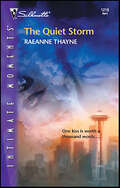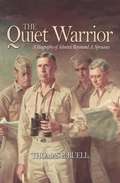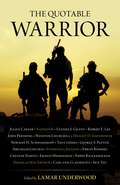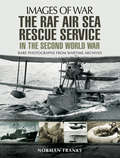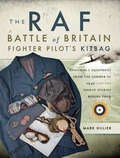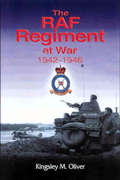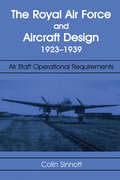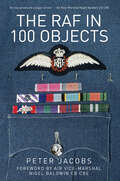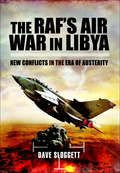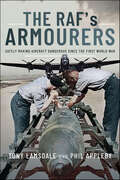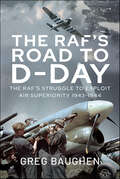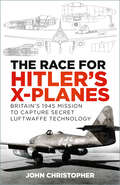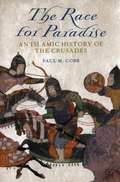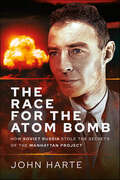- Table View
- List View
The Quick and the Dead: The Perils of Post-War Test Flying
by William Arthur WatertonA pilot&’s behind-the-scenes account of test flying with British aircraft organizations and manufacturers in the early years of the Cold War. Written from the pilot&’s viewpoint, with refreshing candor and honesty, this account details what really went on behind the scenes in the defense world of the 1950s. After serving in World War II, the author continued his flying career, but to his dismay, found that quality was sometimes neglected when developing aircraft—leading to lives lost. Mainly centering on his work with the mighty Gloster Meteor and the Javelin interceptors, The Quick and the Dead is an astonishing report that sparked controversy upon its first publication. It was seen as a wake-up call at a time when British ingenuity and prowess were being overtaken by the Americans and Russians—and offers an astonishing insight into the history of the British aircraft industry.
The Quickening
by Rhiannon Ward'If you like gothic mystery, buckle up! This atmospheric read has it all' Woman magazine'An historical novel dripping with menace'Shari Lapena, author of The End of Her***********England, 1925. Louisa Drew lost her husband in the First World War and her six-year-old twin sons in the Spanish Flu epidemic of 1918. Newly re-married and seven months pregnant, Louisa is asked by her employer to travel to Clewer Hall in Sussex where she is to photograph the contents of the house for auction.She learns Clewer Hall was host to an infamous séance in 1896, and that the lady of the house has asked those who gathered back then to come together once more to recreate the evening. When a mysterious child appears on the grounds, Louisa finds herself compelled to investigate and becomes embroiled in the strange happenings of the house. Gradually, she unravels the long-held secrets of the inhabitants and what really happened thirty years before... and discovers her own fate is entwined with that of Clewer Hall's.For fans of The Silent Companions, The Little Stranger and The Familiars, an exquisitely crafted and compelling mystery that invites the reader in to the crumbling Clewer Hall to help unlock its secrets.**********'Utterly brilliant... full of secrets and deliciously creepy'Lisa Hall, author of The Perfect Couple'A spooky treat, which had me turning the pages faster and faster'Cass Green, author of In a Cottage in a Wood
The Quickening
by Rhiannon Ward'If you like gothic mystery, buckle up! This atmospheric read has it all' Woman magazine'An historical novel dripping with menace'Shari Lapena, author of The End of Her***********England, 1925. Louisa Drew lost her husband in the First World War and her six-year-old twin sons in the Spanish Flu epidemic of 1918. Newly re-married and seven months pregnant, Louisa is asked by her employer to travel to Clewer Hall in Sussex where she is to photograph the contents of the house for auction.She learns Clewer Hall was host to an infamous séance in 1896, and that the lady of the house has asked those who gathered back then to come together once more to recreate the evening. When a mysterious child appears on the grounds, Louisa finds herself compelled to investigate and becomes embroiled in the strange happenings of the house. Gradually, she unravels the long-held secrets of the inhabitants and what really happened thirty years before... and discovers her own fate is entwined with that of Clewer Hall's.For fans of The Silent Companions, The Little Stranger and The Familiars, an exquisitely crafted and compelling mystery that invites the reader in to the crumbling Clewer Hall to help unlock its secrets.**********'Utterly brilliant... full of secrets and deliciously creepy'Lisa Hall, author of The Perfect Couple'A spooky treat, which had me turning the pages faster and faster'Cass Green, author of In a Cottage in a Wood
The Quiet American
by Graham GreeneThe relentless struggle of the Vietminh guerrillas for independence and the futility of the French gestures of resistance become inseparably meshed with the personal and moral dilemmas of two men and the Vietnamese woman they both love. Copyright © Libri GmbH. All rights reserved.
The Quiet Americans: Four CIA Spies at the Dawn of the Cold War -- a Tragedy in Three Acts
by Scott AndersonFrom the bestselling author of Lawrence in Arabia, a gripping history of the early years of the Cold War, the CIA's covert battles against communism, and the tragic consequences which still affect the world todayAt the end of World War II, the United States dominated the world militarily, economically, and in moral standing--seen as the victor over tyranny and a champion of freedom. But it was clear--to some--that the Soviet Union wasalready executing a plan to expand and foment revolution around the world. The American government's strategy in response relied on the secret efforts of a newly-formed CIA.The Quiet Americans chronicles the exploits of four spies--Michael Burke, a charming former football star fallen on hard times; Frank Wisner, the scion of a wealthy Southern family; Peter Sichel, a sophisticated German Jew whoescaped the Nazis; and Edward Lansdale, a brilliant ad executive. The four ran covert operations across the globe, trying to outwit the ruthless KGB in Berlin, parachuting commandos into Eastern Europe, plotting coups, and directingwars against Communist insurgents in Asia. But time and again their efforts went awry, thwarted by a combination ofstupidity and ideological rigidity at the highest levels of the government--and more profoundly, the decision to abandon American ideals. By the mid-1950s, the Soviet Union had a stranglehold on Eastern Europe, the U.S. had begun its disastrous intervention in Vietnam, and America, the beacon of democracy, was overthrowing democratically-elected governments and earning the hatred of much of the world. All of this culminated in an act of betrayal and cowardice that would lock the Cold War into place for decades to come. Anderson brings to the telling of this story all the narrative brio, deep research, skeptical eye, and lively prose that made Lawrence in Arabia a major international bestseller. The intertwined lives of these men began in a common purpose of defending freedom, but the ravages of the Cold War led them to different fates. Two would quit the CIA in despair, stricken by the moral compromises they had to make; one became the archetype of the duplicitous and destructive American spy; and one would be so heartbroken he would take his own life.The Quiet Americans is the story of these four men. It is also the story of how the United States, at the very pinnacle of its power, managed to snatch defeat from the jaws of victory.
The Quiet Americans: Four CIA Spies at the Dawn of the Cold War--a Tragedy in Three Acts
by Scott AndersonFrom the bestselling author of Lawrence in Arabia—the gripping story of four CIA agents during the early days of the Cold War—and how the United States, at the very pinnacle of its power, managed to permanently damage its moral standing in the world. &“Enthralling … captivating reading.&” —The New York Times Book Review At the end of World War II, the United States was considered the victor over tyranny and a champion of freedom. But it was clear—to some—that the Soviet Union was already seeking to expand and foment revolution around the world, and the American government&’s strategy in response relied on the secret efforts of a newly formed CIA. Chronicling the fascinating lives of four agents, Scott Anderson follows the exploits of four spies: Michael Burke, who organized parachute commandos from an Italian villa; Frank Wisner, an ingenious spymaster who directed actions around the world; Peter Sichel, a German Jew who outwitted the ruthless KGB in Berlin; and Edward Lansdale, a mastermind of psychological warfare in the Far East. But despite their lofty ambitions, time and again their efforts went awry, thwarted by a combination of ham-fisted politicking and ideological rigidity at the highest levels of the government.
The Quiet Gunner at War: El Alamein to the Rhine with the Scottish Divisions
by Richmond GorleIn 1939 Dick Gorle was already a professional soldier but stationed in India. After the Dunkirk disaster he was recalled and initially involved in training recruits at Plymouth before going north to form the Highland Division Gunners.We hear of the journey to Egypt and thereafter it is intense action at El Alamein under Monty and the long grueling advance to Tripoli. The invasion of Sicily followed and Gorle describes the horrors of war in the mountains and towns while the locals appeared almost oblivious to the momentous events unfolding around them.Called back to attend Staff College, Gorle rejoined the fray in North West Europe as his Regiment, part of the Lowland Division, received thanks and welcome from those liberated, and fierce and deadly resistance from the retreating Germans. His memoir sums up the elation of victory, the closeness of comradeship and the desperate sadness of losses.
The Quiet Place (Star Trek: The Next Generation #7)
by Peter DavidEver since the fall of the Thallonian Empire, Si Cwan has been searching for his younger sister, the only other survivor of the royal family. His quest has been a hard one, filled with many disappointments, but now it may be nearing its end.... On the planet Montos, a mysterious young woman, whose past is shrouded in secrecy, finds herself pursued by both the fanatical Redeemers and a vicious race of feral predators known only as the Dogs of War. All are in search of information regarding the true nature and location of the Quiet Place, a mystical realm celebrated in myth and legend. Only this same woman, now called Riella, may hold the secret of the Quiet Place, a secret that the Redeemers and others will kill to possess. Is Riella indeed Si Cwan's long-lost sister? Before he can learn the truth, he and his crewmates must brave the unchecked savagery of the Dogs of War -- and enter the terrifying heart of the Quiet Place.
The Quiet Storm
by RaeAnne ThayneBeautiful heiress Elizabeth Quinn really had a medical excuse for having a hard time making conversation. But even if she hadn't, heart-stoppingly handsome detective Beau Riley might have left her tongue-tied. Still, Elizabeth needed the good detective. There had been a murder, and it affected the beloved little boy in her care. So speak with him she must. If only she were sure her traitorous heart would leave it at that....Beau had already tried to get somewhere with Elizabeth--and all it had gotten him was the cold shoulder. And now, suddenly, because she needed his help, she was pursuing him? His head was telling him to get out while the getting was good.Unfortunately, his heart was giving him a different message entirely....
The Quiet Warrior
by Thomas B. BuellRegarded as the standard biography of World War II naval hero Adm. Raymond A. Spruance, this work is now available in trade paperback for the first time. Spruance, victor of the battles of Midway and the Philippine Sea and commander of the Fifth Fleet in the invasions of the Gilberts, the Marshalls, the Marianas, and Okinawa, is one of the towering figures in American naval history. Yet his reserved, cerebral personality did not make good copy for correspondents, and until the publication of The Quiet Warrior he remained an elusive figure. Thomas Buell has succeeded in evoking the nature of the man as well as recording the achievements of the admiral in this brilliant biography, which won the Alfred Thayer Mahan Award for Literary Achievement the year of its publication.
The Quotable Warrior
by Lamar UnderwoodThe Quotable Warrior is quite simply the best collection of quotes from military leaders ever put together, and includes quotations from Thucydides, Julius Caesar, Napoleon, Ulysses S. Grant, Robert E. Lee, Stonewall Jackson, John Pershing, Winston Churchill, Dwight D. Eisenhower, Norman H. Schwarzkopf from the Peloponnesian War to Afghanistan and Iraq, and all wars in-between. This is the most compelling, challenging, and comprehensive collection of quotes about leadership and war ever assembled. It is a rich and balanced collection of the best quotations about war and those who go to war. Here are the reasons that men fight wars, the challenges they face, the tactics and strategies of great battles and campaigns, the horrors of war, the challenge of human courage, and much more.
The R. A. F. At War (Time-Life)
by Ralph BarkerIn a furious debate in the House of Commons in July 1934, Winston Churchill alarmed his colleagues with the news that Germany's Adolf Hitler was secretly building an air arm that within two more years would be able to overwhelm Britain's Royal Air Force--unless the RAF expanded at once. Over the protests of members who denied there was any real threat of war, Parliament voted to keep the RAF at parity with the growing German air force. This would mean building up the RAF's manpower and replacing its aged fleet of biplanes with faster monoplanes. The task would not be easy.
The RAF Air Sea Rescue Service, 1918–1986
by Diane Canwell Jonathan SutherlandBetween 1918 and 1986 the marine branch of the Royal Air Force provided rescue facilities, support and other services to this armed service. In its pre–1941 guise as the Air Sea Rescue service, the RAF had an inventory of over 200 motorboats, supported by float aircraft engaged in rescue, towing, refueling and servicing RAF aircraft. Amongst the many characters of this early period was none other than Lawrence of Arabia.
The RAF Air-Sea Rescue Service in the Second World War (Images of War)
by Norman FranksWhen the Second World War began in 1939 it was thought that it would be fought along the same lines as the First World War, with the Allied air forces operating from both Britain and France. With the fall of Britains Northern European Allies in May 1940, all that changed. From then onwards, RAF aircraft operating over enemy and enemy-held territory necessitated flights across both the North Sea and the English Channel.This meant that aircrew in difficulties would be forced to come down in both of these bodies of water. Therefore it was essential that some form of rescue service be made available to fish these airman from the water. But there were no aircraft in existence at that time that were designed for such a task: initially all that could be done was to use land planes to help locate anyone in the water, drop a dinghy to them, and then guide a boat to their position.Obviously a quicker and more reliable means of rescue was needed, and this came in the shape of the Supermarine Walrus, an amphibian airplane that could land on both sea and land. Several Flights of these airplanes were set up around the coast of Britain, concentrated mainly around the south and southeast of England. The Air Sea Rescue airmen did a magnificent job from 1941-45, rescuing hundreds of downed RAF and USAAF aircrew. It took a special type of airman to undertake these rescues and another kind of courage.As the war in North Africa developed, Walrus aircraft were needed in the Mediterranean, and later on either side of the Italian coast. Walrus squadrons operated just as successfully in this theater as around Britain. Aircrew operating over any stretch of water could always count on the ASR boys coming to their aid. This is their story.
The RAF Battle of Britain Fighter Pilot's Kitbag: Uniforms & Equipment from the Summer of 1940 and the Human Stories Behind Them
by Mark HillierThe scenes are familiar ones; the young Brylcream Boys sat at dispersal waiting for the haunting call of Scramble, lounging in their shirt sleeves and fur-lined boots, their leather flying helmets lying limp by their side. But what did the RAF fighter pilots of the Battle of Britain really wear, and what vital items would their kitbags have held?The casual air of the dashing pilots of Fighter Command in the Spitfire Summer of 1940 conceals a necessarily professional approach to their task of holding Hitlers Luftwaffe at bay. Therefore, each item of clothing and equipment they wore and carried had a role and a function, be it for warmth and comfort, communication, or for fighting and survival.All the objects that an RAF fighter pilot was issued with during the Battle of Britain are explored in this book in high-definition color photographs, showing everything from the differing uniforms, to headgear, personal weapons, gloves, goggles, parachute packs and the essential Mae West life jacket. Each item is fully described and its purpose and use explained.Relive Britains finest hour as never before through the actually clothing and accouterments of The Few.
The RAF Regiment at War, 1942–1946
by Kingsley M. OliverBorn out of necessity in the dark days of the War, the RAF Regiment found itself in the thick of the action supporting the vital operations in all theaters. This comprehensive record of their operations gives the clearest indication of the contribution that the Regiment made and includes many first hand accounts of the fighting, including the first shooting-down of a jet aircraft, the Me 262A-2a Sturmvogel in November 1944. As a result of their outstanding contributions to the success of RAF operations in WW2, the Regiment became a permanent part of the RAF. This is the official history of the RAF Regiment from its foundation 60 years ago to the aftermath of hostilities.
The RAF and Aircraft Design: Air Staff Operational Requirements 1923-1939 (Studies in Air Power #Vol. 9)
by Colin S SinnottThis work examines the evolution of the RAF's operational requirements for its home defence air force - for bombers to mount a deterrent counter offensive and for fighters to provide direct defence of Britain. It discusses the management processes, policies and decisions relevant to operational requirements on the basis of a detailed study of Air Ministry papers of the time. By tracing the development of operational requirements, the author exposes the thinking behind the RAF's quest for effective fighter and bomber aircraft. He describes the ideas and concepts of air warfare that were adopted in the 1920s, and shows how these evolved into the Air Staff's requirements for the aircraft which the RAF entered and fought in World War II.
The RAF in 100 Objects
by Peter JacobsIt was in the closing year of the First World War, on 1 April 1918, that the Royal Air Force was born from the amalgamation of the Royal Flying Corps and Royal Naval Air Service. Since then, the RAF has helped lead the world in the development of aviation and air warfare. From the fighters and bombers of the Second World War, through the early jet age and into modern remotely piloted air systems, the last hundred years’ development has been astronomical, and the human story no less impressive. Here Peter Jacobs gathers the most poignant objects of the RAF’s proud history and displays them together, in full splendid colour, for the first time. Aircraft, memorials, uniforms, equipment, and some items you would never expect – it’s all here, ready to be explored.
The RAF's Air War In Libya: New Conflicts in the Era of Austerity
by Dave SloggettThe uprising in Libya in the spring of 2011 took the world by surprise. The Gaddafi regimes brutal attempts at suppressing the uprising, however, soon prompted the international community to respond. NATO agreed to impose a no-fly zone across Libya, which was led by Britain, France and the USA.For the British Prime Minister, David Cameron, the deployment of RAF and Royal Navy assets in support of UN Resolution 1973, came at a time when severe cuts to the UKs defense spending were in the process of being enacted. With the Royal Navy aircraft carriers and their Harrier jets no longer available, would the UK be able to mount operations 3,000 miles away?In this, the first book to analyze the Libyan campaign, David Sloggett details the causes of the uprising, and examines each stage of the war through to its termination with the death of Colonel Gaddafi.In conclusion, Dr. Sloggett considers the future prospects for a post-Gaddafi Libya and, more significantly, how NATO in general and Britain in particular, will respond to similar events in the future.
The RAF's Armourers: Safely Making Aircraft Dangerous Since the First World War
by Tony Lamsdale Phil ApplebyIt is said that one of the earliest trades in the world is that of the armorer. Historically, it is a profession dated slightly after prostitution, but well before banking! Since the birth of the Royal Flying Corps in 1912 through to the modern Royal Air Force, the role of the armorer has been pivotal. Not for nothing did the founder of the RAF, Lord Trenchard, once declare: ‘The armorer – without him there is no need for an air force.’ In the years since the need for RAF armorers was first recognized, it has been a role that has evolved with the times. What has remained constant, however, is the fact that it is still a fascinating and potentially dangerous trade with many different branches and specialisms. In this book the authors, one of whom, Tony Lamsdale, is himself a former RAF armorer, reveal the previously untold story of how the trade has adapted to the most modern of military machines, the aircraft. The authors look at the shared history of the armorer and the RAF through the eyes of those who served. These veterans’ stories span decades, and their first-hand accounts and insights into conflict and peace-time operations demonstrate the qualities and characteristics that make armorers unique. The book starts with a brief history of the armorer, then before capturing the adventures and exploits of RAF armorers from the Second World War and on into the Cold War. The dangerous duties of the armorers on deployment in such places as the Falklands, Iran, Iraq or Afghanistan are all explored. There is also the question of having to learn of bomb dumps, the use of small arms and the unique world of the armorer with its own peculiar language and the camaraderie of the crew room. With each chapter brought to life through personal anecdotes and shared experiences, this book provides an insight into an utterly essential role which has remained largely hidden – until now.
The RAF's Road to D-Day: The Struggle to Exploit Air Superiority, 1943–1944
by Greg BaughenBy the summer of 1943, the Third Reich’s fate seemed sealed. The combined might of Britain and the Commonwealth nations, the United States and the Soviet Union had made a Germany victory impossible. All that remained to decide was how the Allies should complete their victory. Would strategic bombing decide the outcome or would ground and air forces working together play the more significant role? Greg Baughen follows the air and land battles in Italy, France and Germany between 1943 and early 1944, as well as the equally bitter battles behind the scenes as army and air commanders debated and argued over how the war should be won. He charts the trials, tribulations, and successes of the bomber offensive and assesses whether, in the final analysis, the bomber strategy shortened or lengthened the war. He explains how army air support went backwards after the successes of the Desert Air Force, and how this led to a failure to support the troops landing on the D-Day beaches in Normandy. He also describes the subsequent revival of tactical air support and how it went on to play a key role in the subsequent campaigns but questions whether Eisenhower, Montgomery or Tedder ever fully understood how to make best use of the massive aerial forces available to them. Drawing on archive documents and accounts written at the time, the author tackles some fundamental defense issues. Was RAF independence a benefit or a hindrance to the Allied cause? To what extent was the War Office to blame for shortcomings in army air support? Did Britain understand the way the methods for waging war were evolving in the twentieth century? He takes a look at how the Air Ministry was interpreting the lessons being learned during the war. Were the defense policies of the twenties and thirties still valid? Had they ever been valid? This, then, is the story of the decisions and actions that the RAF followed in the months leading up to D-Day and how air operations evolved in the subsequent campaign.
The RAND Corporation (1989—2009)
by Jean-Loup SamaanBased on a case study of the RAND Corporation, this shows how the uncertainties of US defense policies since the fall of the USSR can be understood and illustrated through an analysis of the evolution of the think tank community, and more particularly through a sociological study of the so-called defense intellectuals such as the RAND Corporation.
The Race for Hitler's X-Planes: Britain's 1945 Mission to Capture Secret Luftwaffe Technology
by John ChristopherDuring World War 2, Hitler’s engineers had pioneered an incredible array of futuristic secret weapons, from the Me 262, the first operational jet fighter, to the deadly V2 inter continental ballistic missile. With the Third Reich shattered and lying in ruins, in the summer of 1945, the Allies launched a frantic race to grab what they saw as the justifiable spoils of war. The Americans and Russians in particular were anxious to secure not only the aircraft and the research and production facilities, but also the key German scientists and engineers.This Nazi technology would define the balance of power in the phoney peace of the Cold War era, launching an arms race that shaped our modern world for decades to come. But what of Britain’s role in this supermarket sweep? The Race for Hitler’s X-Planes tells the untold story of the British mission to Germany.
The Race for Paradise: An Islamic History of the Crusades
by Paul M. CobbIn The Race for Paradise, Paul M. Cobb offers a new history of the confrontations between Muslims and Franks we now call the "Crusades," one that emphasizes the diversity of Muslim experiences of the European holy war. There is more to the story than Jerusalem, the Templars, Saladin, and the Assassins. Cobb considers the Arab perspective on all shores of the Muslim Mediterranean, from Spain to Syria. In the process, he shows that this is not a straightforward story of warriors and kings clashing in the Holy Land, but a more complicated tale of border-crossers and turncoats; of embassies and merchants; of scholars and spies, all of them seeking to manage a new threat from the barbarian fringes of their ordered world. When seen from the perspective of medieval Muslims, the Crusades emerge as something altogether different from the high-flying rhetoric of the European chronicles: as a cultural encounter to ponder, a diplomatic chess-game to be mastered, a commercial opportunity to be seized, and as so often happened, a political challenge to be exploited by ambitious rulers making canny use of the language of jihad.
The Race for the Atom Bomb: How Soviet Russia Stole the Secrets of the Manhattan Project
by John HarteDescribes how Soviet Russia’s leading spymasters in Moscow Center obtained information from British and American physicists to make an atomic bomb. When Nazi Germany began a secret weapons program called “The Uranium Club” in April 1939, Stalin was alerted by his American and British spies of the possibility that German scientists were working to develop an atomic bomb. The British Government and the United States, and Stalin, realized that if Hitler used The Atom Bomb, it could mean the end of the West or the end of the world. John Harte’s new book about The Manhattan Project describes how Soviet Russia’s leading spymasters in Moscow Center obtained information from British and American physicists to make a Soviet atomic bomb at each and every stage when the American bomb was developed at Los Alamos in New Mexico.
